Thomas Tudway (died 1726) was an English musician and Professor of Music at Cambridge University. He is known as a composer, and for his compilation of a collection of Anglican church music.
Contents

Thomas Tudway (died 1726) was an English musician and Professor of Music at Cambridge University. He is known as a composer, and for his compilation of a collection of Anglican church music.

Tudway was born probably before 1650, as he became a choirboy in the Chapel Royal very soon after the Restoration. He is sometimes confused with his father (of the same name) who on 22 April 1664 obtained a tenor's place in the choir of St. George's, Windsor. In 1670 he succeeded Henry Loosemore as organist of King's College, Cambridge, and acted as instructor of the choristers from Christmas 1679 to midsummer 1680. He also became organist at Pembroke College and Great St. Mary's. In 1681 he graduated Mus. Bac., composing as his exercises Psalm 20 in English and Psalm 2 in Latin, both with orchestral accompaniment. [1]
After the death in 1700 of Nicholas Staggins, the first professor of music at Cambridge, Tudway was chosen as his successor on 30 January 1705. He then proceeded to the degree of Mus. Doc.; his exercise and anthem, "Thou, O God, hast heard our desire", was performed in King's College Chapel on 16 April, on the occasion of Queen Anne's visit to the university. He was nominated composer and organist extraordinary to the queen, [1] but the warrant was never executed.
Noted for punning, on 28 July 1706, for an offensive comment of this nature slighting the Queen, Tudway was sentenced to be "degraded from all degrees, taken and to be taken", and was deprived of his professorship and his three organists' posts. On 10 March 1707 he publicly made submission and a retraction in the Regent House. He was then formally absolved and reinstated in all his appointments. Had he not offended the monarch, it seems likely that he would have become a Composer to the Chapel Royal. [2] His music is at least the equal of his contemporaries. He was a Tory, one of the subscribers to John Walker's Sufferings of the Clergy, and a critic of Richard Bentley. [1] [3]
Tudway died on 23 November 1726, and was succeeded as professor by Maurice Greene in July 1730. [1]
Political opinions may have brought Tudway into contact with Robert Harley, 1st Earl of Oxford, for whom he undertook his major work. As an addition to the Harleian Library, Tudway from 1714 copied a representative set of compositions for the Anglican church, then generally unavailable in written form. He accumulated six volumes (Harleian MSS. 7337–42), of over 3000 pages, an effort documented in correspondence with Humphrey Wanley, as he collected 70 services and 244 anthems by 85 composers; of those 19 anthems and a service were by himself. Materials came from manuscripts around England, but the collection was mainly based on old choir-books at Ely Cathedral. A detailed list of the contents appeared in Grove's Dictionary of Music and Musicians . [1]
Thomas Tudway's sacred music is at least the equal of his post-Restoration contemporaries. His writing for the organ as accompanimental instrument is extremely sophisticated, often using solo stops from the instrument in duet with a singer.
A chronological list of anthems. [4]
| Title | Date |
|---|---|
My God, my God look upon me | 1675 |
| O come let us sing unto the Lord | before 1678 |
| Blessed is the People | before 1679 |
| Behold God is my salvation | before 1681 |
| Quare fremerunt Omnes | 1681 |
| The Lord hear thee in the day of trouble | 1681 |
| The Lord hath declared his salvation | 1682 |
| Evening Service in A | before 1684 |
| Not unto us O Lord | before 1685 |
| Let us now praise worthy men | ?1690s [before c.1703] |
| Sing we merrily | ?mid-1690s [before 1706] |
| Is it true that God will dwell with Men? | ?1697 |
| Man that is born of a woman | 1699 |
| Evening service in B flat | ?1702 |
| I am the resurrection | 1702 |
| I heard a voice from heaven | 1702 |
| I will sing unto the Lord | 1704 |
| Thou O Lord hast heard our desire | 1705 |
| I will lift up mine eyes | 1702 or 3 |
| O how amiable | before 1705 |
| Sing O heavens | 1702 to 1705 |
| O Sing unto the Lord a new song | before 1706 |
| Behold how good and joyful | 1707 |
| O Praise the Lord for it is a good thing | 1708 |
| Plead thou my cause O Lord | 1710 |
| My heart rejoiceth | 1713 |
| Give the Lord the Honour Due | 1713 |
| Arise, Shine | before 1714 |
| Te Deum and Jubilate, Commandments | 1720 |
| Hearken unto me | 1724 |
Tudway's anthem "Is it true that God will dwell with men?" was performed in St George's Chapel, Windsor, at Queen Anne's first attendance there; and composed a thanksgiving anthem, "I will sing of Thy great mercies", for the victory at the battle of Blenheim. [1]
The Evening Service in B flat "reflects the final stage of development” in the verse service. [5]
In 1720 Tudway composed anthems and a Te Deum with orchestral accompaniment for the consecration of Lord Oxford's private chapel at Wimpole Hall, adding a Jubilate in 1721. The chapel itself was never consecrated and it seems unlikely that the works were performed there in Tudway's lifetime. Some songs and catches of his were published in various collections, and a birthday ode for Queen Anne was left in manuscript. The anthem "Thou, O Lord, hast heard our desire" was printed by Arnold in Cathedral Music. [1]
Attribution
![]() This article incorporates text from a publication now in the public domain : Lee, Sidney, ed. (1899). "Tudway, Thomas". Dictionary of National Biography . Vol. 57. London: Smith, Elder & Co.
This article incorporates text from a publication now in the public domain : Lee, Sidney, ed. (1899). "Tudway, Thomas". Dictionary of National Biography . Vol. 57. London: Smith, Elder & Co.

Henry Purcell was an English composer of Baroque music.
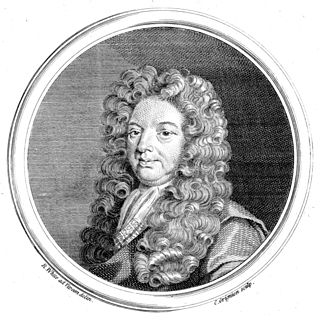
John Blow was an English composer and organist of the Baroque period. Appointed organist of Westminster Abbey in late 1668, his pupils included William Croft, Jeremiah Clarke and Henry Purcell. In 1685 he was named a private musician to James II. His only stage composition, Venus and Adonis, is thought to have influenced Henry Purcell's later opera Dido and Aeneas. In 1687, he became choirmaster at St Paul's Cathedral, where many of his pieces were performed. In 1699 he was appointed to the newly created post of Composer to the Chapel Royal.

Charles Wood was an Irish composer and teacher; his students included Ralph Vaughan Williams at Cambridge and Herbert Howells at the Royal College of Music. He is primarily remembered and performed as an Anglican church music composer, but he also wrote songs and chamber music, particularly for string quartet.

Sir John Goss was an English organist, composer and teacher.
Thomas Tomkins was a Welsh-born composer of the late Tudor and early Stuart period. In addition to being one of the prominent members of the English Madrigal School, he was a skilled composer of keyboard and consort music, and the last member of the English virginalist school.
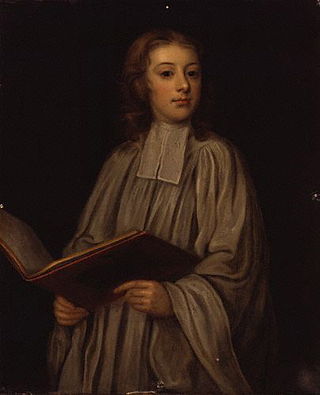
William Croft was an English composer and organist.
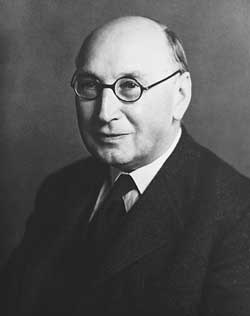
Sir William Henry Harris was an English organist, choral trainer and composer.
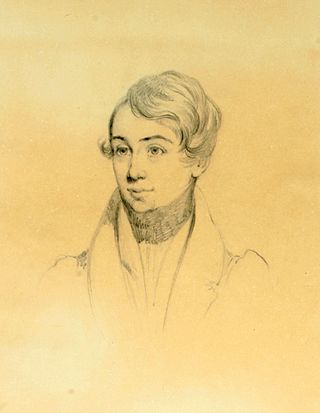
Thomas Attwood Walmisley was an English composer and organist.

Bernard William George Rose, OBE, Doctor in Music, Fellow of the Royal College of Organists, was a British organist, soldier, composer, and academic.
Sir George Job Elvey (1816–1893) was an English organist and composer.

Malcolm Courtenay Boyle (1902–1976) was a British organist and composer.
John Mundy was an English composer, virginalist and organist of the Renaissance period.
William Russell was an English organist and composer.
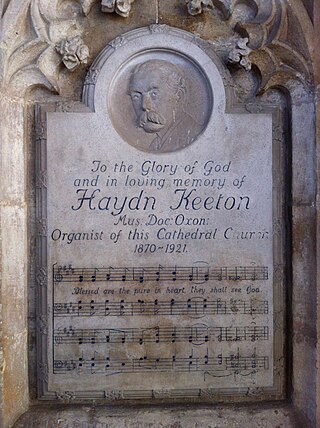
Haydn Keeton was a cathedral organist, who served at Peterborough Cathedral.
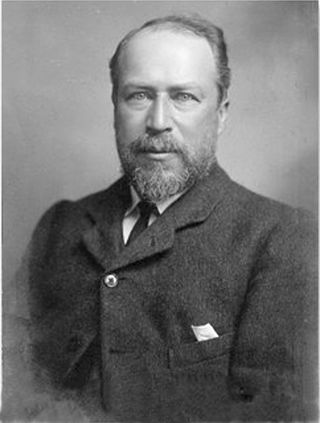
Charles Harford Lloyd was an English composer who became a well-known organist in his time.

"Remember not, Lord, our offences", Z.50, is a five-part choral anthem by the English baroque composer Henry Purcell (1659–95). The anthem is a setting of a passage from the litany compiled by Thomas Cranmer, Archbishop of Canterbury, and later included in the Anglican Book of Common Prayer. It was composed circa 1679–82 at the beginning of Purcell's tenure as Organist and Master of the Choristers for Westminster Abbey.
Francis Pigott was an English Baroque composer and organist.
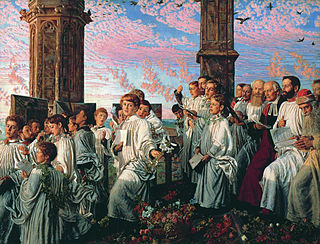
Benjamin Rogers was an English organist and composer, widely known in Europe in his time. Modern taste prefers his consort music, where his reputation in the 18th century was for liturgical music and anthems. His Hymnus Eucharisticus beginning Te O Patrem colimus is sung annually on Magdalen Tower on May day morning.

O clap your hands is a motet by Ralph Vaughan Williams. He composed the anthem, a setting of verses from Psalm 47, in 1920 for a four-part choir, organ, brass, and percussion. He later also made versions for orchestra and for organ. The motet was often recorded.
John Tomkins was a Welsh-born organist and composer, a half-brother of the composer Thomas Tomkins. He was organist at St Paul's Cathedral in London from 1619.